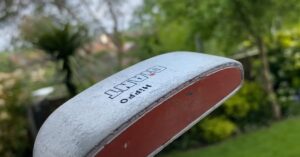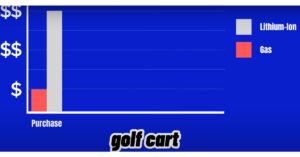Are Golf Balls Safe for Dogs? [Definitive Guide]
Dogs’ wide-eyed excitement at new playthings is familiar to us. As golf enthusiasts, it’s common for our furry friends to come across golf balls. But the question that often leaves us puzzled is, are golf balls safe for dogs?
Golf balls aren’t safe for dogs. They can choke on them or injure their teeth due to the hard material. Ensure your dog’s safety by keeping them away from golf balls at all times.
Today, we’re going to dive into this topic, offering a thorough understanding of the potential risks associated with golf balls and dogs.
What are the Dangers of Golf Balls for Dogs?
Golf balls can pose several dangers to dogs. The hard, dense surface of golf balls can cause choking, blockages, dental fractures, or even internal injuries if swallowed. Let’s see in detail-
Choking Hazard
Golf balls, being small and spherical, can pose a choking hazard, especially for larger dogs. If a dog attempts to swallow or play with a golf ball, it can become lodged in its throat, leading to a potentially life-threatening situation.
Dental Damage
Golf balls are made of hard rubber or synthetic materials, which can cause dental damage if a dog chews on them. Their teeth may fracture or break due to the hard impact, leading to pain and potential oral health issues.
Digestive Blockages
Swallowing a golf ball can result in digestive blockages in a dog’s gastrointestinal tract. The ball may get stuck, causing discomfort, vomiting, or other serious health problems.
Immediate veterinary attention is necessary to address the blockage and prevent further complications.
Toxic Materials
While not all golf balls contain toxic materials, some coatings or components used in golf balls may be harmful if ingested by dogs. These toxic substances can lead to gastrointestinal distress or other health issues.
It’s crucial to prioritize your dog’s safety by preventing their access to golf balls and providing appropriate dog toys instead.
Regularly monitoring your dog during playtime and seeking immediate veterinary care if you suspect ingestion or any related issues is essential.
How to Tell if Your Dog Has Eaten a Golf Ball?
If you suspect that your dog may have eaten a golf ball, it is important to take immediate action, as it can be a serious medical emergency. Here are some signs that your dog may have ingested a golf ball:
Behavioral changes
Watch for any unusual behavior in your dog. They may become lethargic, restless, or display signs of discomfort or pain.
Loss of appetite
If your dog suddenly loses interest in food or refuses to eat, it could be a sign that something is wrong.
Vomiting
Keep an eye out for repeated episodes of vomiting, especially if the vomit contains foreign objects or blood.
Abdominal pain
Dogs may exhibit signs of abdominal discomforts, such as whining, panting, or reluctance to be touched around the belly area.
Changes in bowel movements
Look for any changes in your dog’s stool. They may have difficulty passing stool, or you may notice blood in the stool.
Difficulty breathing
In severe cases, if the golf ball is causing an obstruction, your dog may have difficulty breathing. They may exhibit rapid breathing, coughing, or choking sounds.
Swollen abdomen
A golf ball lodged in the gastrointestinal tract can cause the abdomen to swell due to an obstruction.
What to Do if Your Dog Eats a Golf Ball?
If your dog has eaten a golf ball, it is important to take immediate action to ensure their safety. Here are the steps you should take:
Stay calm
It can be alarming to see your dog ingest a foreign object, but it’s important to remain calm and focused.
Assess the situation
Try to determine if your dog has actually swallowed the golf ball or if it’s stuck somewhere in its mouth or throat. If you’re unsure, check for any signs of choking or distress.
Do not induce vomiting
Unlike some other foreign objects, inducing vomiting in this situation can be dangerous. The golf ball could potentially get lodged in the throat or cause further damage.
Contact your veterinarian
Call your veterinarian immediately to inform them about the situation. They will be able to provide guidance based on your dog’s size, breed, and the circumstances surrounding the ingestion.
Follow your vet’s instructions
Your veterinarian may ask you to bring your dog in for an examination or recommend monitoring them at home.
They might also advise specific measures to help facilitate the passage of the golf ball or suggest an X-ray to assess its location.
Monitor your dog
Keep a close eye on your dog for any signs of distress, discomfort, or changes in behavior.
Look out for symptoms such as vomiting, gagging, difficulty breathing, abdominal pain, or a lack of appetite. If you notice any concerning symptoms, contact your veterinarian immediately.
How To Ensure Your Dog’s Safety From Golf Balls?
Ensuring the safety of your dog is essential when it comes to activities involving golf balls. Here are some friendly tips and elaboration on each point to help you keep your dog safe-
Avoid Encouraging Play with Golf Balls
It’s important to discourage dogs from playing with golf balls to minimize the associated risks.
Golf balls are not designed as dog toys and can pose hazards such as choking, dental damage, and digestive blockages.
Instead, provide your dog with suitable dog toys that are specifically designed for their safety.
Look for durable toys that are appropriate in size for your dog’s breed, ensuring they can enjoy playtime without any potential harm.
Provide Suitable Dog Toys
Opting for toys specifically designed for dogs ensures their safety during play. Dog toys are typically made with materials that are safe for chewing and durable enough to withstand their play style.
Look for toys made of sturdy rubber or nylon, and consider interactive toys that engage their minds and keep them entertained.
By providing appropriate toys, you can redirect their attention away from golf balls and provide a safe and enjoyable play experience.
Supervise Outdoor Activities
When engaging in outdoor activities involving golf balls, it’s crucial to monitor your dog closely. Dogs may be tempted to chase or pick up golf balls, leading to accidental ingestion or choking.
By supervising them, you can quickly intervene if they show interest in the golf balls and redirect their attention to a safe alternative.
Keeping a watchful eye on your dog during outdoor playtime helps ensure their safety and prevents potential accidents.
Train and Educate
Consistent training and positive reinforcement can teach your dog to avoid picking up or chewing on golf balls.
Start by teaching them basic commands such as “leave it” or “drop it” so they understand not to interact with items they shouldn’t have.
Reward them with praise or treats when they follow your commands successfully.
Additionally, educating yourself about dog bite prevention and understanding your dog’s body language can help you read their cues and anticipate any potential risks.
By investing time in training and educating your dog, you can instill good behaviors and create a safer environment for everyone.
FAQs
Below, we have compiled a list of frequently asked questions to address any lingering concerns you may have regarding the potential hazards associated with dogs and golf balls. These responses aim to provide clarity and alleviate any doubts you may have!
Why are golf balls unsafe for dogs?
Golf balls can pose a choking hazard, especially for larger dogs, and contain toxic materials that can harm them. Additionally, chipped pieces of golf balls can damage their intestines or esophagus.
Can dogs chew on golf balls without any harm?
No, dogs should not chew on golf balls. Golf balls are made of hard rubber, and chewing on them can potentially injure a dog’s teeth.
Are there any risks associated with swallowing golf balls?
Yes, swallowing golf balls can lead to digestive blockages, causing pain, vomiting, and other serious health problems. Immediate veterinary attention is necessary if a dog swallows a golf ball.
Do all dogs face the same risks with golf balls?
Dogs of all sizes are at risk with golf balls, but larger dogs are more likely to swallow them or choke on them. Dogs of any size should not handle golf balls due to the associated dangers.
What should I do to ensure my dog’s safety around golf balls?
To ensure your dog’s safety, avoid encouraging play with golf balls, provide suitable dog toys as alternatives, supervise outdoor activities involving golf balls, and train your dog to avoid picking up or chewing on them.
Conclusion
While our canine companions may find golf balls fascinating, they’re simply not designed for dogs.
As responsible pet owners, it’s our job to keep our pets safe by being mindful of potential hazards like golf balls.
The next time your four-legged friend gives you that excited look, make sure you toss them a safe, dog-friendly toy instead of a golf ball.





